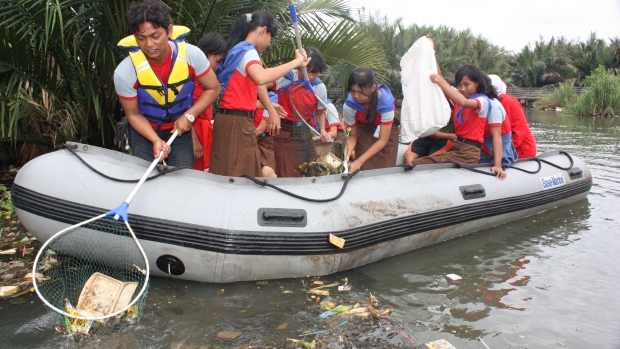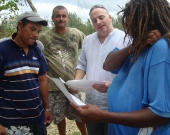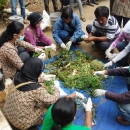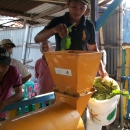Grants :: Small Grant Facilities :: Managing Angke Kapuk Wetland as Part of Natural Resource Conservation
Managing Angke Kapuk Wetland as Part of Natural Resource Conservation

Clean up action by school students facilitated by JGM at Jak ... , Indonesia © JGM, 2010
Objectives
This Jakarta Green Monster (JGM) project aimed to improve the ecological functions of the Angke Kapuk wetland and so conserve important habitats and biodiversity. The project was also designed to develop a participatory community waste management system that will generate extra income for local communities while also conserving the coastal environment.
Background
The Angke Kapuk wetland is an important biodiversity area, particularly rich in birds (90 species have been recorded, with some rare endemics). Many communities living upstream of the wetland are extremely poor and have no access to waste disposal facilities other than the Angke and Ciliwung rivers. The waste they throw into these rivers is deposited in the wetland, degrading the environment and threatening its biodiversity values. By supporting practical cooperation among a wide range of stakeholders, the project sought to raise living standards and reduce pressure on an important coastal habitat.
Target beneficiaries
Members of Kapuk Muara village and students from nearby schools (such as Tarakanita 3 Elementary School).
Outputs
- The project planted 0.5 hectares of mangroves in collaboration with the private sector, the local community and NGOs, including a religious organization which supported planting in other non-target areas. A subsequent joint survey with the provincial Marine and Fisheries Agency of Jakarta found low survival rates in the arboretum (60%) but encouraging results in the “ecotourism forest” (90%).
- Monitoring of flora and fauna for the MFF-led national inventory and relevant institutions and stakeholders.
- Organization of waste clean-up and bird watching events to raise awareness and stimulate interest among adults and students in ecologically valuable local assets.
- Organization of many community training events on waste sorting and recycling. “Compost for community” mechanisms were established and two paper shredders donated to the local community.
- Involvement of local schools in making recycled paper products such as business cards and tissue boxes. Training was planned for making charcoal briquettes and recycling plastics.
- The establishment of a child and visitor friendly waste-sorting centre in the community.
Accomplishments and challenges
The efforts of JGM and MFF have resulted in a much cleaner living environment for the local community, and have involved learners in developing small recycling businesses. A notorious local “dirty corner” is now a cheerful and colourful village recycling centre, as well as a popular learning and recreation area for families.
JGM successfully engaged businesses, schools and community groups in planting mangroves and raised awareness on related issues. Importantly, the project publicized an asset previously viewed as a problem – waste. Another achievement was engaging and cooperating with the regional authority of North Jakarta in a Joint Working Committee on collaborative waste management.
Challenges
One challenge is what to do with the useful data collected and lessons learned by the project. Such information needs to reach the right people if it is to be disseminated and replicated. Another challenge has been flooding by high tides and unusually heavy rainfall, both of which delayed activities.
Contributions to cross-cutting themes
Communications
Vinyl posters were produced informing the public of recycling activities, and data collected on the flora and fauna in mangrove planting areas were made available. Communication by word of mouth and social networking also proved effective in publicising project events and initiatives.
Gender equality
Women were well-represented in the project. Fifteen school students, all female, took part in the mangrove monitoring. The women in the “Seven Moms” women’s group were largely responsible for driving the development of recycled goods. Lastly the proportion of women in training events ranged from 25% to 83%.
Climate change
Planting half a hectare of mangroves can make only a small contribution to sequestering carbon. Yet, importantly, even a small stand of mangroves can help to mitigate the impact of extreme weather events related to climate change. Mangroves absorb wind and tidal energy, and have acted as lifebelts for people seeking sanctuary in past disasters.
Lessons Learned
Engaging with school students and their teachers proved to have a knock-on effect, drawing in parents, friends and family members.
Working closely with local authorities (in this case the Mayor of North Jakarta and the District Governor of North Jakarta) enhanced project visibility and the sustainability of project outputs.
The project found that documenting and mapping mangrove planting in the form of a “before and after” record is essential. Without it, keeping track of or even determining the survival of planted mangroves is difficult.
Related News
MFF projects encourage public participation in coastal management
Bangkok, Thailand 25 Jul 2012
Country: Asia Region
Topic: Capacity development, Civil Society Engagement, Capacity Building ...
MFF aims to achieve long term solutions that contribute to regional and national efforts that ensure environment issues are mainstreamed in development planning and activities. Hence, bringing together governments, non-government entities and the pr...
Project Facts
Country
Location
Muara Angke, North Jakarta, Indonesia
Topic
- Knowledge for Management
- Civil Society Engagement
- Capacity Building
- Climate change
- Gender equality
- Knowledge management and communications
Duration
4th May 2010 to 4th Jul 2011
MFF Grant Amount
US$25,000
Implementing Partner
Dr Enny Sudarmonowati
Project manager
Jakarta Green Monster, Jl. Harsono Rm
No. 1, Pusat Laboratorium, Universitas
Nasional, Ragunan, Jakarta 12550
Tel: +62 21 7800981
Fax: +62 21 7801024
Email: info@jakartagreenmonster.or.id
s_enny@hotmail.com
Web: www.jgm.org.id
“We will start a business making name cards from recycled paper. Our teacher will help us (maybe she’ll buy some!). But at least now we know that if we treat waste wisely then it can also give us economic benefit!”
— RIA HANDYANI
SCHOOLGIRL (AGE 12)




